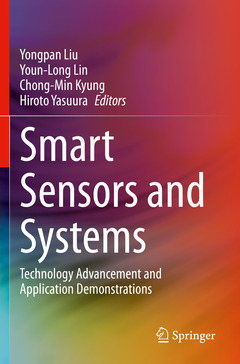Smart Sensors and Systems, 1st ed. 2020 Technology Advancement and Application Demonstrations
Langue : Anglais
Coordonnateurs : Liu Yongpan, Lin Youn-Long, Kyung Chong-Min, Yasuura Hiroto

This book describes for readers technology used for effective sensing of our physical world and intelligent processing techniques for sensed information, which are essential to the success of Internet of Things (IoTs). The authors provide a multidisciplinary view of sensor technology from materials, process, circuits, and big data domains and showcase smart sensor systems in real applications including smart home, transportation, medical, environmental, agricultural, etc. Unlike earlier books on sensors, this book will provide a ?global? view on smart sensors covering abstraction levels from device, circuit, systems, and algorithms.
- Profiles active research on smart sensors based on CMOS microelectronics;
- Describes applications of sensors and sensor systems in cyber physical systems, the social information infrastructure in our modern world;
- Includes coverage of a variety of related information technologies supporting the application of sensors;
- Discusses the integration of computation, networking, actuation, databases, and various sensors, in order to embed smart sensor systems into actual social systems.
Introduction.- Biomimetic Materials and Structures for Sensor Applications.- CMOS Integrated Lab-on-chip System for Personalized Biomedical Diagnosis.- Performance Enhancement of LED Spectrophotometry based on Pseudo BJT System.- mm-scale Sensors: Ultra-Low Power Sensor Platform for Future IoT Applications.- Smart Sensor Microsystems: Application-Dependent Design & Integration Approaches.- Energy Efficient RRAM Crossbar-based Neuromorphic Computation for Smart Camera.- NVRAM-Assisted Optimization Techniques for Flash Memory Management in Embedded Sensor Nodes.- Artificially engineered compound eye sensing systems.- Intelligent Vision Processing Technology for Advanced Driver Assistance Systems.- Implantable optical neural interface.- Realtime programmable closed-loop stimulation/recording platforms for deep brain stud, or Mobile ECG sensing and linear/nonlinear analysis systems.- Internet of Medical Things: the Next PC (personal care) Era.- UV Sensors based on Flexible Materials.- Urine Microchip Sensing System.- Construction of Indoor GPS and In-and-outdoor Integrated Navigation System.- Proximity-based Federation of Smart Objects and their Application Framework.- Edge Computing for Cooperative Real-Time Controls using Geospatial Big Data.- Challenges of Application of ICT in Cattle Management.- Data Health: Sensor Data Analysis for
a Hospital and Developing Countries.
Yongpan Liu received his B.S., M.S. and Ph.D. degrees from Electronic Engineering Department, Tsinghua University in 1999, 2002, and 2007. He worked as a Research Assistant in Circuit and System Divisions in Tsinghua University from 2002 to 2004. (Referred to CV) His main research interests include: Embedded System, Nonvolatile Computing, Electronics Design Automation and Power/Thermal Aware VLSI Design and Test. Our group currently focuses on High Performance Low Power circuit device, chip architecture and system design methodology on next generation computing applications.
Youn-Long Lin is a Tsing Hua Chair Professor of Computer Science of National Tsing Hua University. He was born in Yun-Lin, Taiwan. He received his B.S. degree in electronics engineering from National Taiwan University of Science and Technology (formerly, National Taiwan Institute of Technology), Taipei, Taiwan, in 1982, and his Ph.D. in computer science from the University of Illinois, Urbana-Champaign, IL, U.S.A. in 1987. Upon his graduation, he joined National Tsing Hua University, Hsin-Chu, Taiwan, where he established the THEDA Group (Tsing Hua EDA), served as Director of the University Computer and Communication Center, Chairman of the Department of Computer Science, Secretariat General of the University, Chief Librarian of the University Library, and the Dean of Research & Development. He is also an adjunct professor of Peking University, Beijing and a guest professor of Waseda University, Japan.
Chong-Min Kyung received B.S. in EE from Seoul National University in 1975, M.S. and Ph.D. in EE from KAIST in 1977 and 1981, respectively. From 1981 to 1983, he worked at Bell Telephone Laboratories, Murray Hill. Since he joined KAIST in 1983, he has been working on CAD algorithms, 3-D graphics, and System-on-a-Chip design and verification methodology, development of various RISC/CISC microprocessors,
Profiles active research on smart sensors based on CMOS microelectronics Describes applications of sensors and sensor systems in cyber physical systems, the social information infrastructure in our modern world Includes coverage of a variety of related information technologies supporting the application of sensors Discusses the integration of computation, networking, actuation, databases, and various sensors, in order to embed smart sensor systems into actual social systems
Date de parution : 06-2021
Ouvrage de 203 p.
15.5x23.5 cm
Date de parution : 06-2020
Ouvrage de 203 p.
15.5x23.5 cm
Thème de Smart Sensors and Systems :
© 2024 LAVOISIER S.A.S.



